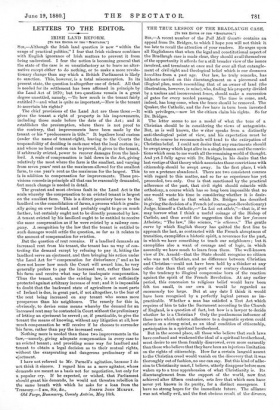LETTERS TO THE EDITOR.
IRISH LAND REFORM.
[TO THE EDITOR OF THE SPECTATOR:1
SIE,—Althongh the Irish land question is now "within the range of practical politics," I fear that Irish violence combines with English ignorance of Irish matters to prevent it from being understood. I fear the notion is becoming general that the state of the case is so unsatisfactory as to leave no alter- native except either to do nothing, or to make a more revolu- tionary change than any which a British Parliament is likely to sanction. This, however, is a total misconception. In its present state, the question is altogether one of detail. All that is needed for its settlement has been affirmed in principle by the Land Act of 1870; but two questions remain in a great degree unsettled, namely, —To how much is the tenant fairly entitled ?—and what is quite as important, —How is the tenant to ascertain his rights?
The chief provisions of the Land Act are these three :—It gives the tenant a right of property in his improvements, including those made before the date of the Act ; and it establishes the preiumption, where there is not proof to the contrary, that improvements have been made by the tenant or his "predecessors in title." It legalises local custom (under the name of tenant-right), leaving to the Courts the -responsibility of deciding in each case what the local custom is ; and where no local custom can be proved, it gives to the tenant, if arbitrarily evicted, power to recover damages from the land- lord. A scale of compensation is laid, down in the Act, giving relatively the most where the farm is the smallest and varying 'from seven years' rent as the maximum allowed for the smallest farm, to one year's rent as the maximum for the largest. This is in addition to compensation for improvements. These pro- visions concede in principle all that can be reasonably demanded, 4mt much change is needed in detail.
The greatest and most obvious fault in the Land Act is the scale whereby the compensation to an evicted tenant is largest on the smallest farm. This is a direct pecuniary bonus to the landlord on the consolidation of farms, a process which is gradu- ally going on over Ireland, and probably ought to go on much farther, but certainly ought not to be directly promoted by law. A tenant evicted by his landlord ought to be entitled to receive 'the same compensation as if he were evicted by a railway com- pany. A recognition by the law that the tenant is entitled to such damages would settle the question, so far as it relates to the amount of compensation for eviction.
But the question of rent remains. Tf a landlord demands an increased rent from his tenant, the tenant has no way of con- testing the demand except by refusing to pay it, letting the landlord serve an ejectment, and then bringing his action under "the Land Act for "compensation for disturbance ;" and as he does not know how much the Court will award him, he very generally prefers to pay the increased rent, rather than lose Iris farm and receive what may be inadequate compensation. 'Thus the tenant, under the existing law, is not sufficiently --protected against arbitrary increase of rent; and it is impossible -to doubt that the backward state of agriculture in most parts of Ireland is due, in great part, if not altogether, to the fear of -the rent being increased on any tenant who seems more prosperous than his neighbours. The remedy for this is, -obviously, to devise some means whereby the demand for an increased rent may be contested in Court without the preliminary of letting an ejectment be served; or, if practicable, to give the -tenant the means of knowing, without any litigation at all, how -much compensation he will receive if he chooses to surrender 'his farm, rather than pay the increased rent.
Nothing more is needed than these two improvements in the Flaw,—namely, giving adequate compensation in every case to an evicted tenant; and providing some way for landlord and -tenant to obtain a legal decision as to their mutual rights, -without the exasperating and dangerous preliminary of an 'ejectment.
I have not referred to Mr. Parnell's agitation, because I do -ndt think it sincere. I regard him as a mere agitator, whose 'demands are meant as a basis not for negotiation, but only for a popular cry. If he expected, or wished, that Parliament should grant his demands, he would not threaten rebellion in the same breath with which he asks for a loan from the


































 Previous page
Previous page